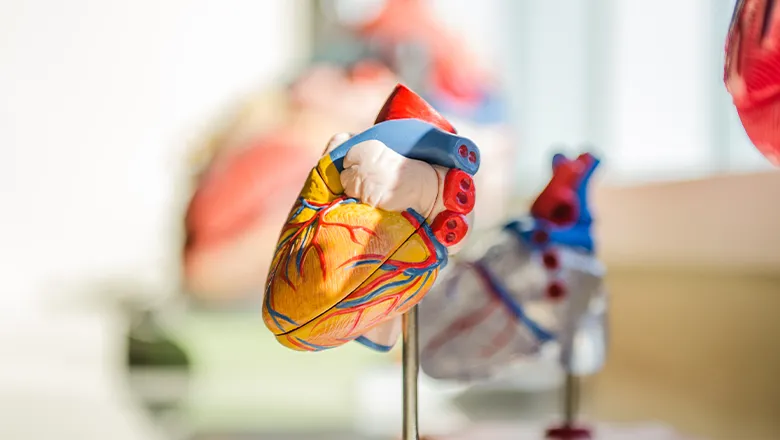22 September 2021
Getting to the Heart of the Matter
For World Heart Day, 29 September 2021 - this article was originally published in the Autumn/Winter 2019 issue of InTouch.

The average heart will beat over two billion times across its lifetime. But if this vital organ encounters difficulties, the results can be devastating; 180 people die of heart disease every day in the UK alone.
Here at King’s, we are working to improve outcomes for cardiology patients. One of the unique features of King’s is the partnership between the university and King’s Health Partners hospitals. Our research translates world-leading science into advances in clinical practice, making a difference between life and death for many of the patients our clinicians treat. This article highlights just a few of the important projects currently being undertaken.
Detecting Heart Abnormalities in Babies
Some heart conditions require the earliest possible intervention. When a heart problem is suspected in a baby before birth, the mother will be referred to a foetal cardiologist. The details of a baby’s heart problem can be difficult to diagnose with ultrasound alone, but to date there have been no other reliable alternatives. Our research team – including Dr David Lloyd, Dr Kuberan Pushparajah and Professor John Simpson of Evelina London Children’s Hospital, and Professor Reza Razavi, Vice President & Vice Principal (Research & Innovation) and Director of Research at King’s Health Partners – has developed new techniques using MRI scans performed in pregnancy to produce high-resolution 3D images of babies’ hearts in the womb. Professor Razavi says, ‘This work is already being translated into a clinical service at St Thomas’ Hospital. It allows a firm diagnosis to be made and so provides clinical teams and parents with the certainty to prepare for the birth of the child, ensuring prompt treatment that improves outcomes.’
What Happens When You Put Cardiology Researchers Together with cosmologists?
A collaboration between King’s Cardiology and the Institute of Cosmology & Gravitation has received a grant from the Science and Technology Facilities Council to undertake research into using artificial intelligence (AI) in diagnosing and treating people with cardiac arrest. Drawing on the cosmologists’ expertise in this field, Specialist Registrar in Cardiology Nilesh Pareek and his team, supervised by Professor Ajay Shah, have developed a novel method of predicting culprit lesions (blocked arteries) following cardiac arrest. Nilesh says, ‘The decision-tree model we have produced outperforms all previous methods. We are now looking to integrate this into future trials at King’s to validate the model further and improve our accuracy in predicting blocked arteries.’ King’s is continuing to build the cardiology team to look specifically into AI research. We have also secured funding for a cardiology ‘hackathon’ early next year. A hackathon, an event where a group of experts convenes to tackle a specific problem, is a concept more common in data science and cosmology than in health sciences. This one will bring together experts from both fields to try to produce a practical solution to a cardiology problem in just 24 hours.
Patients Participating in Research
Our cardiac research team aims to offer every patient the opportunity to take part in research. The more patients we can involve, the more we can build up data, leading to more accurate prediction methods and more effective treatments. One important example of this is the ARREST study. Researchers are examining whether those suffering from cardiac arrest outside of a hospital setting are best served by being transferred immediately to a Heart Attack Centre or to the nearest Emergency Department, as per current guidelines. This study could help us to establish whether early transfer to a specialist centre with access to facilities to treat the cause of the arrest, including unblocking of the arteries, improves survival compared to current standard treatment. All London hospitals have been invited to take part in this study, and it has now rolled out to 31 centres across London. Technological advancements can also have significant impact on patient outcomes. Trials have now begun, for example, on TriCinch, a repair valve that allows a percutaneous treatment (access through the vein at the groin) without the need for a potentially dangerous surgical intervention when the tricuspid valve needs to be replaced. In other cases, surgery is still required. Surgery to repair the mitral valve is traditionally carried out through the extremely invasive method of sternotomy, where the sternum is cut completely from the collar bone to the bottom of the breastbone. A team led by Ranjit Deshpande (principal investigator) and Abigail Knighton (lead research nurse) is trialling a new, minimally invasive procedure that allows the valve to be repaired using a much smaller cut on the side of the chest. This less invasive approach to heart surgery can drastically reduce surgical trauma on patients. Professor Reza Razavi It allows a firm diagnosis to be made and so provides clinical teams and parents with the certainty to prepare for the birth of the child, ensuring prompt treatment that improves outcomes. Heart disease is the leading cause of death in the UK. Research projects like those mentioned in this article are making a real difference to the outcomes of patients.
Thanks to the support of our alumni, donors, and philanthropic organisations like the William Frederick Haines Foundation, we are closer than ever to discovering life-changing treatments and early detection methods that can mean the difference between life and death.
